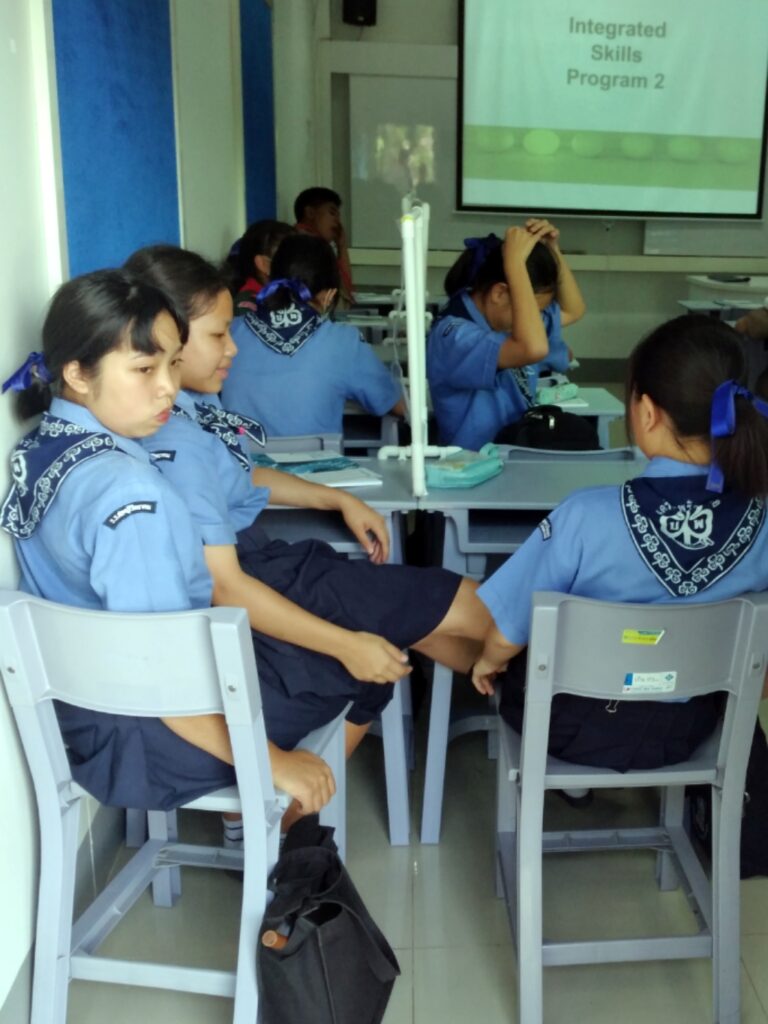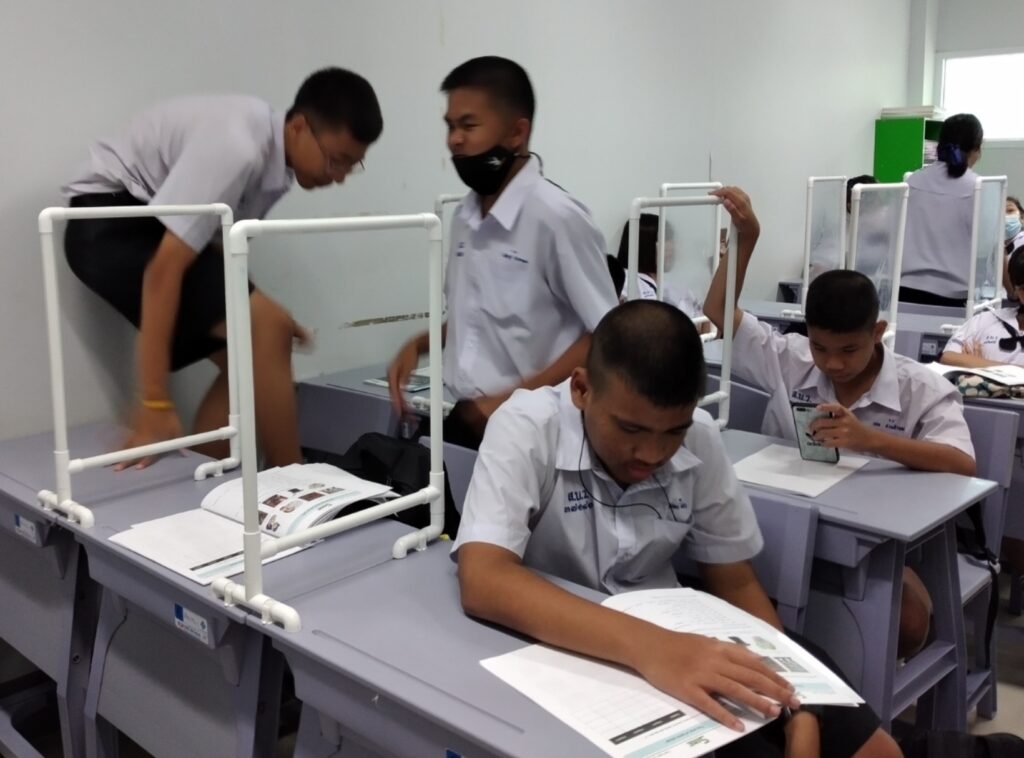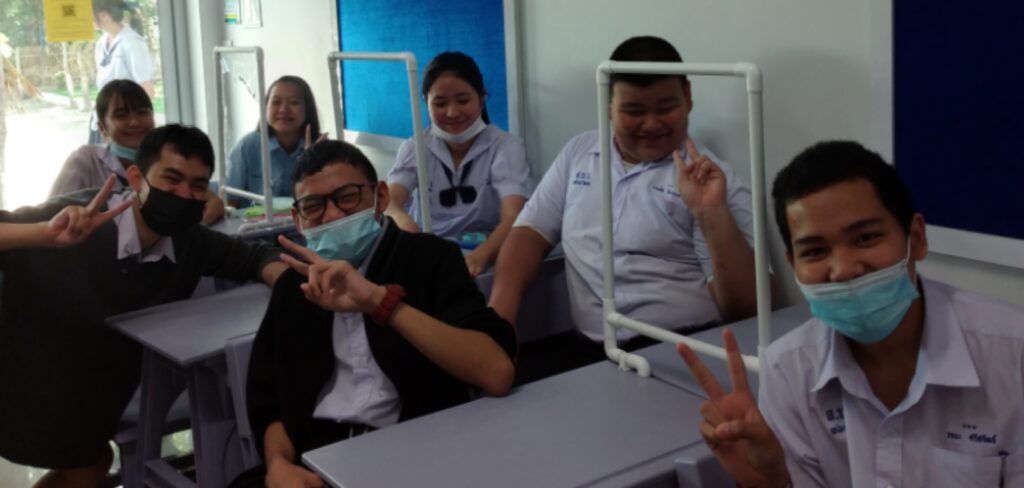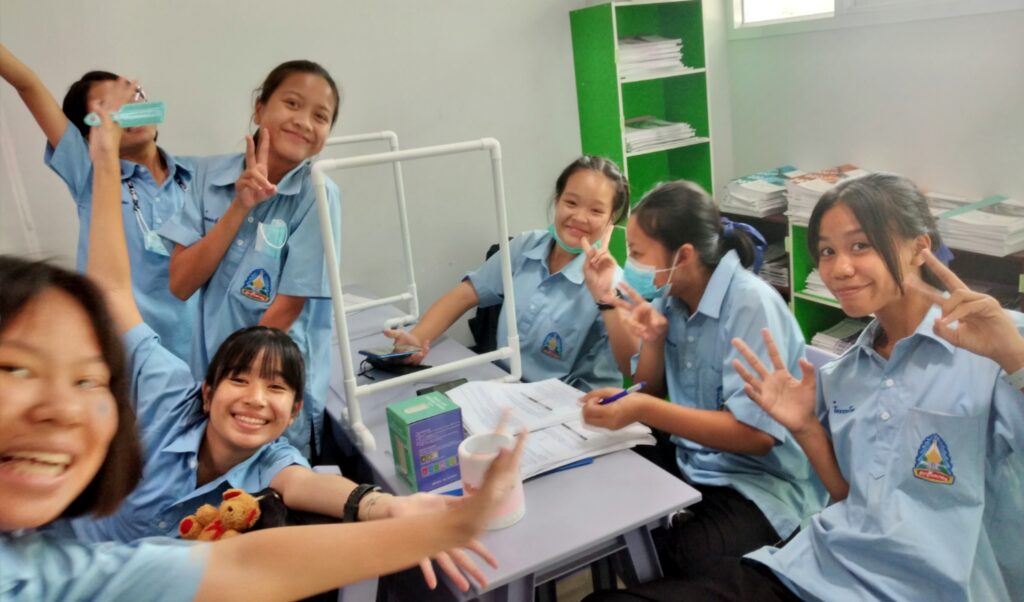
“I LOVE TEACHER” Photo of my whiteboard (with a pink filter)
Congratulations to me for surviving my first proper first-term gig during which the only consistency was inconsistency. Constantly changing schedules, welcoming new teachers, saying goodbye to other teachers, swapping classes, filling in for other classes, and falling in love with all of my students. It has been a mutual love-fest, to which my whiteboard above attests. Without further ado, here’s an assessment of Term 1:
“Wo Love laoshi”
My students wrote in half pinyin, half English “Wo Love laoshi”, which translates into, “I love teacher.” As is customary, I was standing outside my door, greeting my students as they entered the classroom. A couple of girls who arrived first ended up taking a marker and wrote on the board, “Wo Love laoshi” (they are also studying Chinese). I saw they had also written “teacher so cute.” I took the marker and responded by writing, “Students are so CUTE!” Our whiteboard conversation continued, with students writing, “Do you love me?” and I wrote on the board, “Yes! I love you!”
I thoroughly enjoyed this method of communication with my students, with our mutual affection on center stage for all to see. I did not have time to erase our dialog before the next class, so as students began filing in, they saw what had been written from the previous class.
One boy immediately took a marker and above the word “laoshi” (teacher), wrote my name in Korean (!)—so that it read, “Wo Love 김 아영 = I love Ayoung Kim.” I will laugh in three languages: LOL, 555 (Thai), ㅋㅋㅋ (Korean).

Above: electricity outage is no excuse to cancel class. Here, Thai teachers have assembled their students outside on the ground.

This boy—the runt of the class—is often hoisted up like a sack of potatoes or mashed to the ground like… mashed potatoes? In any case, he is often the play-thing of his classmates. I took this photo of him before rescuing him, to which he sighed, “Thank you Teacher.”

Students often sit on each other’s laps and display a level of closeness bereft of shame or self-consciousness.

Lana is seated on one student’s lap, with her feet in another student’s lap! She’s the queen!
Below: The boys shred the Covid screens, and the girls repair them using decorative tape.

Or fashion damaged Covid screens into curtains.

Speaking Test:
In the middle of the term, we administered three different tests: written, listening, and speaking. For the speaking test, students were given a script they had to memorize and repeat with a partner. All of my students were terrified of this test. Understandably, public speaking is terrifying for all of us, even in our native languages.
Below: Students cramming for the speaking test.

Uh oh, time for “laying on the hands”—memorize faster!

Still cramming…

Time’s up! Speaking tests held outside in the hallway.

Once a cheerleader, always a cheerleader
I had spent the previous week prepping my students for the speaking test. We repeated the script over and over again. I drilled pairs multiple times. I recorded myself saying the script and let my students listen to it in order to improve their pronunciation. Would it be enough?
The morning of the test, one student approached me, clutching her book, saying, “Teacher! I can’t do it!”
I put my hand on her shoulder and said, “You can do it!”
She begged me to let her use her book because she was not able to memorize all of the script. I relented, but told her I would have to deduct points. We began the test, and her voice was clear. Although she had to lean on her book, and although she had some difficulties with pronouncing some words, she did it. And that’s exactly what I said.
Actually, I whooped, “Yeah! You did it!” I clapped my hands, and put my arm around her shoulder. I was smiling ear-to-ear, beaming like a proud parent. I knew it was a huge challenge for her, I knew she was scared, and so I wanted to let her know what an accomplishment it was.
Next up, I had two boys. They are very smart, but they were very nervous. What I have seen in my top students is that although they routinely get the highest scores, they are also the most high-strung. They began the speaking test—each had memorized their part. There were some pauses, but they figured it out, and proceeded to nail the speaking test. I was impressed.
“Bak-su! bak-su! 박수! 박수!” I said, while clapping (bak-su means “applause”). My students finally broke into relieved smiles, and which became even bigger when they saw they had scored perfect points.
It was the head teacher’s idea to conduct the test outside in the hallway. He reasoned that students would refuse to get up and do the test in front of their peers, and that it would be impossible to hear them inside with all of their classmates. However, about twenty minutes into the test, I noticed a couple of things:
1) I was sweating a ton. It was monsoon season, with 90% humidity. Feeling heavy and sticky, it was difficult to contemplate an entire day seated outside getting wiped out by the weather.
2) I was creating a commotion by cheering and clapping so loudly—so much so that I startled some of my colleague’s students. I was literally the only teacher making noise. (One day I will write a story about how I didn’t choose cheerleading, but cheerleading chose me at the tender age of nine).
I don’t know how my colleagues offered congratulations, or if they did at all. I did observe one teacher leaning back in his chair, scolding two students for stumbling and forgetting parts of the speaking test.
“You’re supposed to know this!” he scoffed. “We already practiced this!” he said, glaring, without offering any further support.
I, on the other hand, found that if I gave a little hint, such as sounding the first letter such as “ss”, my students remembered easily and were able to finish the test. Not only that, their dignity was left intact, and they left with a feeling of accomplishment.
I made the decision to conduct my tests inside the classroom. Student pairs would come stand at the front of the classroom, and I would stand right next to them, as if we were having a three-way-conversation. I discovered that by “publicizing” the speaking test, the rest of the students were able to witness the entire process, and see that their peers survived. Not only that, but when I would offer up a big cheerleader-cheer, the entire class would erupt in “bak-su” and applaud. This put everyone at ease, and students actually lined up, eager to take the test!
Completed the test — thumbs up!

Or, chilling on the teacher’s desk (ie, mine).

The new student in my class…keep trying…
As is customary, I was standing outside my door, welcoming my students as they filed in. Two boys smiled right at me and swept inside. Moments later, I heard a commotion. The girls were yelling and gesticulating and pointing,
“Teacher! They are in my seat!”
“Teacher, they are not in this class!”
Indeed, the two back-packed boys were seated in the girl’s seats, which is the rear of the class. I approached them and asked, “Hello, are you new students?”
One boy nodded and said, “Yes!”
“Oh,” I said, “Are you joining my class today?”
“Yes!” he replied.
“Ok, well our class is having a big test today, are you ready to take it?”
“Oh no, we can’t take a test,” and the boys filed out.
The next class, I am standing outside my door, welcoming my students as they filed in. One boy smiled and said, “Hi teacher!” and swept inside. This time he took a seat in the first row. I approached him and said, “Hello, are you a new student?”
“Yes!” he said, smiling.
“Are you joining my class today?”
“Yes!” he said confidently.
“Ok, well today everyone has to stand up and give a speech. Are you ready to do it?”
“Yes!” he said, calling my bluff. But a minute later, he returned to his own class.
Another day, as I was explaining the lesson to my class, I saw his head pop up in my window. He had snuck out of his class to wave “Hi” to me. I waved back. Then he went back to his own class.
Could my students be any cuter?

I rest my case.

“I Like…YOU!”
The aforementioned class was one of my most cherished classes. Every single student astonishingly adorable. As I looked out upon the classroom, all I saw were puppies. In my eyes, they were all Golden Retriever puppies —the cream of cute. It so happened that I was presenting a lesson in which I was leading them to fill in the blanks. I would read the first part of the sentence, and then I would gesture to a student to finish the sentence by filling in the blank. For example:
“In the early mornings, I…” and here I would gesture to a student to finish the sentence.
One student said, “I take a shower.” Another said, “I play games”—as in—video games.
Onto the next sentence: “In the afternoon, I…” and I gestured to a student. He said, “I play games.”
“Ok,” I said, “I’m sensing a theme here. Everyone likes to play games!”
Then I introduced the next sentence: “I like…” and I gestured to a student.
Looking directly into my eyes, he said, “You.”
He delivered the word “you” with such conviction, as if I had asked him, “Does the sun rise in the morning? Is the sky blue? Do you need air to breathe?”
Thrown off by this student’s answer—I had been positive he would say, “I like to play games.”
I thought for a moment he had responded in Thai. When my students don’t know the English word, they will say it in Thai, so for a moment I was trying to figure out what “you” means in Thai. Then I heard other students scolding him, saying, “You can’t say that to the teacher!”
I realized he meant “you” as in “me” as in—he likes me! OMG! Usually, when my students flirt with me, they smile and laugh, making it a light joke. This boy was serious.
“Oh! Uh, ok,” I sputtered, then awkwardly moved on, firing the same sentence to the next boy.
“I like…” I gestured to him.
He said, “You.”
Uh oh. I was sensing a new theme, and sought to head it off. Thus, I swiftly moved to the girls.
“I like…” I prompted, and a female student answered, “bananas.”
“Bananas! Good answer!” I said with relief.
“I like chocolate,” said another student.
“Yesss!” I shouted as if she’d just scored a winning goal.
The next girl said, “I like to go shopping.”
“We all like to go shopping!” I shrieked like a Pentecostal preacher.
With that, I concluded the lesson and dismissed all my puppies.



Cinderella Story
One of my colleagues repeatedly complained about one of his classes. He admitted to me that he swore at some boys in that class in both English and Thai, and that he took one boy by the scruff and hauled him out of his class. One day as I was standing outside my class, waiting to welcome my students, this teacher said to me, “I hate this f*** class so much!”—and his students were standing right there with us!
Without delving into a long essay about foreign teachers lacking ethics, not to mention training, or qualifications, and how the host country inadvertently fosters such situations due to preferring white and young teachers without proper vetting, I will point out that all of this teacher’s actions are in direct violation to our company’s policies. The head teacher knows about this teacher’s behavior, but doesn’t reprimand or correct in any way. What the head teacher did do was give this class to me.
The first class was rough. When I introduced the vocabulary, not one student repeated it after me. Their books were filled with spelling errors. They remained mute when it was time to repeat the dialog. Then I realized that the teacher in question dismissed his half of this class section within fifteen minutes—another violation. He had not been teaching at all. Instead, he had been feeding the students all of the answers to quickly fill in their books, then he kicked them out.
With persistence, I kept presenting the vocabulary, repeating it until a handful of students would repeat it after me. I stuck my nose in every book, correcting spelling errors. When it was time to repeat the dialog, I paired students together and personally supervised, correcting pronunciation errors and giving encouragement. I was so scared the students would rebel and demand to be let out after fifteen minutes, but they stayed in my room for the full class time without complaint!
I led rudimentary games to play, such as spelling out numbers. They struggled to even spell the number “nine”. However, once divided into teams, they attacked the game and we ended up laughing all together as teams screamed how to spell the numbers to their teammates.
I had heard such gossip about the “bad boys” that when they appeared after skipping our first meeting, I was nervous. However, I treated them as I treat all of my students: with respect. I present the lesson. I listen, I correct, I encourage. One boy in particular repeatedly introduced himself, blurting his name out in the middle of the lesson. Unflustered, I said, “Yes, hello Mik, nice to meet you.” When I dismissed the class, he put his hands together in wai and said, “Thank you teacher!”
“See you next time Mik!” I said.

Above: students dressed in kimonos.
It was during the next class, while I was rolling through the vocabulary that I suddenly caught a strong whiff of something. It smelled fragrant. I looked down the aisle and saw Mik splashing himself with cologne! The opened bottle was on his desk, and he was smearing his hands on his neck. Pretending as if nothing was amiss, as if boys dousing themselves in cologne was a normal, daily occurrence, I kept the lesson moving.
On a side-note, Mik actually has good reading skills and clear pronunciation. I repeatedly told him so during our dialog time, and also during his speaking test.
When I dismissed the class, Mik hopped up and hustled to collect all of the student books, collating them in correct order. He lowered his head and humbly offered the books to me.
“Thank you teacher!” he said.
“Thank you Mik!” As I watched him scamper after his friends, I could not see a “bad boy”. All I saw was a Golden Retriever puppy. Reeking of cologne.

Treats from my students.
God Bless you Teacher
I never prayed so hard as when I started this job. I prayed for the stamina to endure long days, for ability to teach skillfully. Then I began praying to reach my students who seemed unreachable; I prayed for forgiveness when I felt an interaction went poorly. I prayed for all my students’ well-being and happiness.
Then one day, one of my classes entered my classroom twenty minutes early. Without saying a word, one boy picked up the books and began placing them on the desks—doing my job. I noticed during the entire lesson, we seemed to be connecting on such an intimate connection; we were all highly tuned into one another. When I dismissed the class, several boys helped to collect the books and put them away.
One boy lingered behind, and when all of the students had exited the room, he suddenly spun around and said, “God bless you teacher.”
I was genuinely touched. With my hand to my heart, I said, “God bless you.”

Above: cheesecake in the form of Swiss cheese! A gift from one of my students.
Unbuttoned shirts, nipples, oh my!
After such a reverential close to the previous class, it was inevitable our next meeting would exhibit something more earthy, more yang-to-my-yin, more gin than fizz, and waay too much flesh.
Our lesson contained a writing component in which students had to introduce their friend. They had to list two good things and one bad thing. Common sentences read, “My friend _____ is good at playing football, and playing games. She is bad at English.”
Others offered trivia that let me know more about my students, such as “Gucci”—yes, “Gucci” is this student’s real nickname—”is a good dancer. He is bad at math.”
Other students were surprisingly frank: “My friend ________ is a good baker. She bakes delicious cookies and shares them with me. She is bad at losing weight. She eats everything.”
It was during this lesson that two boys—Poom and Ice—showed up. Poom attended class more regularly than Ice, but they both generally cut class, arrived late, and performed minimal work. However, I noticed that for the past few weeks, while they continued to arrive late, they actually sought me out to help them pronounce and spell words—ie—they were actually putting effort into English class.
This lesson was no different, as they called me over to read over their work. Poom wrote that “Ice is good at playing games and smoking. Ice is bad at quitting smoking.” Again—Thai students give such frank appraisals of their friends!
“Oh dear,” I said, “Is this true Ice? Are you bad at quitting smoking?”
Ice laughed with a tinge of embarrassment, and nodded.
Then I bent down to read Ice’s work: “Poom is good at playing football and smoking. Poom is bad at—”.
“Teacher, look!”
I looked up to find myself eye-level with Ice’s bare chest. His school shirt had been completely unbuttoned, with Boom proudly holding it open as if Ice were a tatted-up OG-rapper. Except he isn’t.
I stood up. “Oh. My. What is going on here?” I asked rhetorically. Then another student called me over for help—a girl—Thank God!
I read her writing: “My friend ____ is good at falling in love.”
“Oh really?” I asked.
She nodded, smiling as she added, “I am good at falling in love too.”
Sheesh, was something in the air? Hmm, rhymes with pheromones… hormones!
I was starting to hear Nelly’s “Hot in Herre.” My students could have just written:
Hot in, so hot in here! So hot in, hot, oh!
With a little but of, uh uh, and a little bit of, uh uh…
It was time to dismiss the class. I stood at the front of the room and said, “Thank you students. You have all worked very hard today.” I spied Ice with his school shorts completely unzipped. I feared for a moment that he would drop trou. However, he tucked in his shirt, thankfully buttoned up by now.
“Thank you students!” I said.
“Thank you teacher!” they responded, and filed out.
It’s gettin hot in herre (so hot), so take off all your clothes
I am gettin so hot, I wanna take my clothes off…
Lesson on internet safety

Above: student advertisement about keeping passwords safe.
During class time, I never sit at my desk. I never sit in my chair and point to the screen. I am constantly pacing and circling like a shark. I am constantly looking in their books to read their sentences. Part of this is to make sure all students feel included in the lesson; another part is to keep them on their toes, knowing I am certain to approach them at any time. Through this daily interaction, I built genuine relationships. Instead of coming at them in the traditional dictator-domineering style (as is common in Asia), I sought to create respectful connections.
Another reason I went to the effort to look in every student workbook was that it was an opportunity to learn more about them. They revealed to me how funny, clever, and smart they are. Just look at the advertisement above. When I saw that, I laughed out loud. “Thank you for reminding me,” I said. “I shall never reveal my password, and I shall never reveal my underwear to the public.”

In a hurricane-themed lesson, students had to draw their version of a storm-shelter, and also draw some items they would bring with them into the shelter. Since hurricanes are native to the US and not to Thailand, they could not fathom what it would be like to evacuate. I had them visualize being in the basement with no windows. “Won’t you need light? Won’t you want a flashlight, or a lamp?”
Looking in one boy’s book, I saw he had drawn a basketball. “Oh, you like basketball?” He nodded. “Do you watch the NBA?” Immediately, he flashed his phone at me. Live video of the NBA playoffs. I raised my eyebrows and asked, “Who do you think is going to win? The Lakers or the Heat?”
“The Lakers!” he said.
“Who is your favorite basketball player?” I asked.
“Bam Adebayo!”
“Oh, but you like the Heat!” I said.
He and his friends were shocked that:
1) I didn’t scold him for watching the NBA finals during class.
2) That I was interested in what he was watching.
3) I knew who Bam Adebayo was.
After that, he and his friends paid more attention to me during class, and we developed a stronger bond.

In an earthquake-themed lesson (yes—it was “Natural Disasters” week) students had to list items they would pack in their earthquake survival kit. Among items such as first aid kits and flashlights, one student wrote that she would bring her teddy bear. Another wrote he would bring a helmet (so practical!) and yet other wrote he would bring his homework (so sincere!).
Another wrote, “I will pack chocolate chip cookies in a big box.”
“Oh, I like this answer so much!” I said, “chocolate chip cookies are necessary to survive!”

In the tsunami-themed lesson, we learned about the “Tsunami survival capsule” which is a spherical, water-tight pod that floats on water. It looks claustrophobic, although I suppose the majority of people will suffer through tight-fitting-digs over drowning to death. Except for a couple of my students. When asked if they would like to stay in the pod for days on end, waiting to be rescued, one student said “No.”
“No? You would not like to escape into the pod?”
He shook his head.
“You would rather… what?” I probed.
“Die,” he said matter-of-factly. His honesty was refreshing.
I guided my students to look at the survival capsule again and asked, “There is a big problem with this survival capsule; can anyone tell me what it is?”
One boy raised his hand and said, “Teacher, I’m too fat.”
I shook my head and said gently, “No, that is not the biggest problem. The biggest problem is that there is no toilet.” I had them visualize what it would be like to stay in the pod for days on end without a toilet. Sorry, I had to go there. I’m a teacher who likes to keep it real.
Like the other lessons, students had to draw pictures of what items they would take with them into the survival capsule. I saw pictures of plastic bags and toilet paper (in lieu of a toilet), phones, ramen, one order of hamburger with fries, a mother, a dog, candy, and one boy’s future wife.
In these life-or-death-themed lessons, I saw their innocence, understood what was important to them and glimpsed a bit of what they saw for their future. I was honored to be privy to it.
Thank you to all my adorable puppies for an amazing term!

Leave a Reply